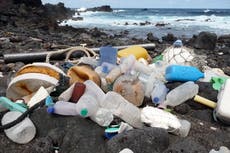High levels of microplastics leak from baby bottles during formula prep, study finds
Baby bottles made with polypropylene can release up to 16 million microplastics, and trillions of even smaller nanoplastics, per litre, the study found

High levels of tiny plastic pieces known as microplastics are released from baby feeding bottles during formula preparation, according to a new study.
Scientists also discovered a link between heat and microplastics. Warm liquids, like formula or water used to sterilise bottles, leads to a greater release of the minuscule fragments.
Micro (and even tinier nano) plastics are released into our food and water systems through the breakdown of larger plastic waste.
There is evidence that humans can ingest microplastics via the food chain due to the vast amount of plastic pollution in the ocean.
However the research notes that the direct release of microplastics from plastic products in everyday use is still being investigated.
The study, involving scientists from Trinity College Dublin, has led to a set of recommendations for preparing formula in plastic feeding bottles, to minimise the leak of microplastics.
The study, published in the journal Nature Food, looked at the release of microplastics from feeding bottles made with polypropylene.
Polypropylene is one of the most widely used types of plastic in the world, particularly for food prep and storage items like lunch boxes, kettles and infant-feeding bottles. However, its capacity to release microplastics has not been fully appreciated, the research team noted.
Researchers estimated the exposure of 12-month-old infants to microplastics in 48 countries and regions.
Among the key findings are that:
* Baby bottles made with polypropylene can release up to 16 million microplastics, and trillions of even smaller nanoplastics, per litre;
* Sterilisation in hot water significantly increases microplastic release from 0.6 million to 55 million particles per litre, when temperature increases from 25C to 95C;
* Other products, like kettles and lunchboxes made with polypropylene plastic, release similar levels of microplastics;
* The average daily exposure level for infants is more than 1 million microplastics, with Oceania, North America and Europe having the highest levels of potential exposure;
* Modifying sterilisation and formula prep can significantly reduce micro plastic leak.
The research also recommended ways to sterilise and prepare formula:
* Sterilise the bottle in line with World Health Organisation recommendations;
* Prepare sterilised water by boiling it in a non-plastic kettle/cooker, like glass or stainless steel;
* Rinse the sterilised bottle using room temperature sterilised water at least three times.
And to prepare formula, the study says:
* Boil water in a non-plastic kettle or cooker;
* Prepare infant formula in a non-plastic container using at least 70C water;
* Cool to room temperature and transfer prepared formula into a high-quality plastic infant-feeding bottle.
The study also says not to reheat prepared formula in plastic containers, particularly in the microwave; don’t vigorously shake the formula in the bottle; and don’t use ultrasonic cleaners on plastic infant-feeding bottles.
Professor John Boland, from Trinity’s School of Chemistry who was part of the study, said: “When we saw these results in the lab we recognised immediately the potential impact they might have.
“The last thing we want is to unduly alarm parents, particularly when we don’t have sufficient information on the potential consequences of microplastics on infant health.”
He added: “We are calling on policy makers, however, to reassess the current guidelines for formula preparation when using plastic infant feeding bottles.
“Crucially, we have found that it is possible to mitigate the risk of ingesting microplastics by changing practices around sterilisation and formula preparation.”
Join our commenting forum
Join thought-provoking conversations, follow other Independent readers and see their replies
Comments


Bookmark popover
Removed from bookmarks